|
|
|
Sort Order |
|
|
|
Items / Page
|
|
|
|
|
|
|
| Srl | Item |
| 1 |
ID:
091290
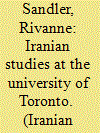

|
|
|
|
|
| Publication |
2009.
|
| Summary/Abstract |
The International Society for Iranian Studies (ISIS) fortieth anniversary celebration at the University of Toronto provided an opportunity to research and record the development of Iranian studies at the university. Iranian studies emerged in 1961 as a major sub-field of the newly established Department of Islamic Studies (now the Department of Near and Middle Eastern Civilizations (NMC)). Presently, the university has a diverse and yet cohesive cadre of academic talent and offers a breadth of courses, which makes it unique in Canada. The language-based discipline of an earlier generation of scholars has become the present multi-faceted program of today, addressing a wide variety of academic and community interests. The University of Toronto academic tradition, the scholarship of early faculty, and the immigration of Iranians have contributed to shaping Iranian studies in Toronto.
|
|
|
|
|
|
|
|
|
|
|
|
|
|
|
|
| 2 |
ID:
110882
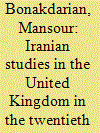

|
|
|
|
|
| Publication |
2010.
|
| Summary/Abstract |
This essay provides a general introductory survey of Iranian and Iran-related studies in the United Kingdom in the twentieth century (including languages, literature, and the arts), with a very brief preliminary foray into earlier Iran-related scholarship and wide-ranging imaginations of Iran in Britain and Ireland, as well as some concluding remarks on contemporary knowledge production about Britain in Iran. Among other themes covered in the essay are the varied contributions of non-Britons and non-Irish to Iran-related scholarship and imaginations in the United Kingdom, underscoring the overall transnational production, dissemination, reception, and utilization of knowledge (history, geography, archaeology, cultures, ethnography and anthropology, art and architecture, Iran-related Persian-language literatures and poetry, etc.). In particular, the essay highlights the contributions made by individuals from, and institutions in, the Indian subcontinent to "British" scholarship and knowledge about Iran.
|
|
|
|
|
|
|
|
|
|
|
|
|
|
|
|
| 3 |
ID:
138907
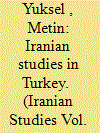

|
|
|
|
|
| Summary/Abstract |
Among other Middle Eastern countries, Iran and Turkey stand out as the two neighboring countries with many linguistic and cultural similarities. The question that comes to the fore is: to what extent do these two countries know each other? This article attempts to provide a picture of the state of Iranian Studies in Turkey with specific attention to three monographs originally written as PhD dissertations in various Turkish universities over the last three decades. Produced from within three different social science and humanities divisions, i.e. Political Science, Persian Literature and History, these are three of the very few scholarly monographs produced on Iran in Turkey. Based on a close reading of these studies, it seems possible to observe that they are mostly ill-balanced by methodological, ethnocentric as well as Turkish nationalist biases.
|
|
|
|
|
|
|
|
|
|
|
|
|
|
|
|
| 4 |
ID:
144712
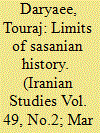

|
|
|
|
|
| Summary/Abstract |
This essay discusses the position of Sasanian Studies from its inception in the late nineteenth century, to its reinvigoration at the beginning of the twenty-first century. The work also discusses the development of the field of Sasanian history and civilization vis-à-vis the three fields of Iranian, Islamic and Late Antique Studies. It is posited that Sasanians have benefited from cross-disciplinary and new historical frameworks that go beyond the traditional field of Iranian Studies, which was never as interested in the history of the period.
|
|
|
|
|
|
|
|
|
|
|
|
|
|
|
|
| 5 |
ID:
143586
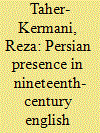

|
|
|
|
|
| Summary/Abstract |
This study employs keyword searches of literary databases such as Literature Online (LION) in an attempt to map the image of “Persia” in nineteenth-century English poetry as it was molded by a proliferation of thoughts and ideas in a variety of contexts. Completeness is not possible, of course, but the article aims to identify and explore some of the major categories within which the image of Persia was formed and disseminated in the nineteenth-century. The scope of the study is not confined to a corpus of poetic works that were written specifically on or about “Persia,” but takes account of a broader range of poems, and attends to the structure, texture and variations of the presence of “Persia” in nineteenth-century English poetry.
|
|
|
|
|
|
|
|
|
|
|
|
|
|
|
|
| 6 |
ID:
154105
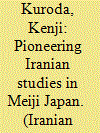

|
|
|
|
|
| Summary/Abstract |
This article explores the relationship between academic studies concerning Iran in Meiji Japan (1868‒1912) and Orientalism in Western scholarship. Many researchers who have limited their definition of Iranian studies to the professional works published since the 1930s have concluded that there is an indirect relation between Iranian studies in Japan and Orientalism. In contrast, this paper takes it in a wider sense to mean all academic studies regarding Iran. The paper focuses on two such important proto-academic fields regarding foreign countries in Meiji Japan: geography and international politics. It concludes that the pioneering Iranian studies scholars in the Meiji period were not totally immune to Orientalism on the one hand but, on the other, that their research on Iran was less closely connected to imperialism than the Western scholarship that Edward Said famously critiqued.
|
|
|
|
|
|
|
|
|
|
|
|
|
|
|
|
|
|
|
|
|